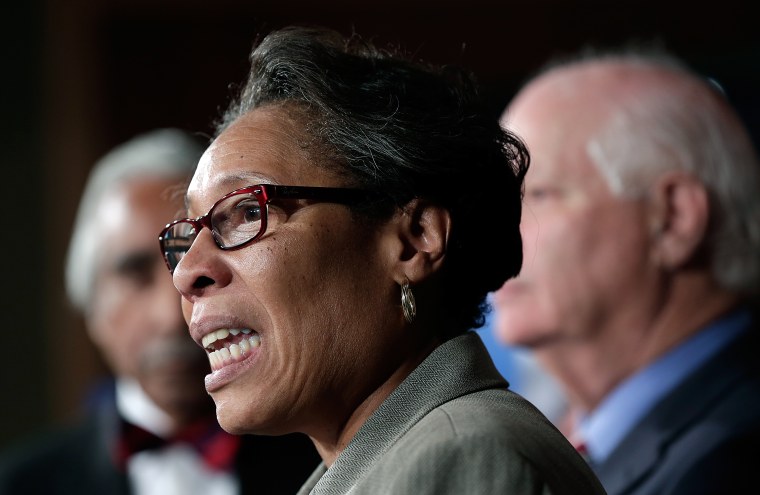The Congressional Black Caucus called the St. Louis grand jury's decision not to indict Ferguson Officer Darren Wilson in the Aug. 9 shooting death of unarmed black teenager Michael Brown a "slap in the face" to Americans.
RELATED: No indictment for Officer Darren Wilson in shooting death of Michael Brown
"The Ferguson grand jury's decision not to indict Officer Darren Wilson in the death of Michael Brown is a miscarriage of justice. It is a slap in the face to Americans nationwide who continue to hope and believe that justice will prevail," Chairwoman Marcia Fudge posted Monday night on the group's Facebook page. “This decision seems to underscore an unwritten rule that black lives hold no value; that you may kill black men in this country without consequences or repercussions."
The August shooting in Ferguson, Missouri, reignited a national debate on race and use of lethal force by police. St. Louis County prosecutor Robert McCulloch, who announced the grand jury's decision around 9:30 p.m. ET Monday, said it was undeniable that Wilson had shot and killed Brown in the altercation. But, he added, the grand jury "determined that no probable cause exists" to indict the white officer.
Demonstrations in a confined area of Ferguson that began peacefully in the wake of the announcement took a nasty turn as looters plundered local stores and protesters flipped cars and set buildings and police vehicles ablaze. Chief Jon Belmar of the St. Louis Police Department said the protests were "probably much worse than the worst night we ever had in August" immediately following the shooting. Eighty-two people were arrested and 12 buildings were burned beyond saving, according to officials. Some residents, though, remained peaceful during the night and early morning hours.
Protests also erupted nationwide, from New York City and Washington, D.C., to Chicago and Oakland, California.
Other groups had similar reactions and expressed disappointment at the outcome of the case. The American Civil Liberties Union (ACLU) called Brown's death part of an "alarming national trend of officers using excessive force against people of color, often during routine encounters."
"Yet in most cases, the officers and police departments are not held accountable. While many officers carry out their jobs with respect for the communities they serve, we must confront the profound disconnect and disrespect that many communities of color experience with their local law enforcement," the group wrote in a statement.
President Barack Obama addressed the country in a rare evening appearance, urging peaceful protest and the Justice Department's efforts to improve community engagement and representation within their local law enforcement agencies. He also highlighted his administration's commitment to improving the quality of policing in impoverished areas.
Americans, he said, can't ignore that "there are still problems, and communities of color are not just making these problems up."
Brown's parents called on their supporters to help them campaign to ensure that all police officers working around the country wear body cameras. U.S. Attorney General Eric Holder confirmed that a federal investigation into the incident would continue to determine whether civil rights charges should be filed against Wilson.
Late Monday night, the National Association for the Advancement of Colored People (NAACP) formed the "Journey for Justice." The NAACP, along with senior and youth organizations, will embark on a 120 mile, seven-day march from the Canfield Green Apartments — the complex associated with Brown's shooting — to the Missouri Governor's Mansion in Jefferson City. They are calling for new leadership of the Ferguson Police Department and reforms of law enforcement practice and culture across the country. During the journey, which is set to begin Saturday morning, marchers will participate in teach-ins and rallies.
"The death of Michael Brown and actions by the Ferguson Police Department is a distressing symptom of the untested and overaggressive policing culture that has become commonplace in communities of color all across the country," said Cornell William Brooks, NAACP president and CEO.
Marc Morial, president and CEO of the National Urban League, said the grand jury's decision "does not reflect the best of what our nation can be."
"This is not a proud day for America," he added. "When we abandon the very foundational tenet of justice for all, we abandon a core part of who we are as a nation."
